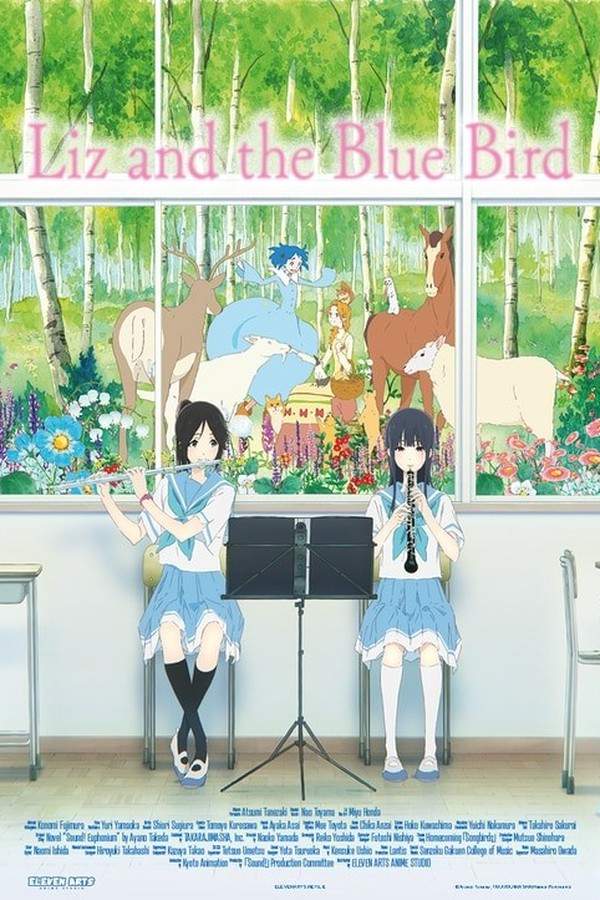Liz and the Blue Bird 2018

Mizore and Nozomi have been close friends since high school, their bond strengthened by a shared love of music. As they prepare for graduation, their final concert becomes a poignant moment, featuring a duet that reflects the sadness of their approaching separation. The prospect of attending different colleges creates a subtle tension, threatening to fracture their long-standing friendship. This heartwarming story explores the complexities of growing up and the challenges of maintaining relationships through significant life changes, ultimately leading to an emotional and resonant conclusion.
Does Liz and the Blue Bird have end credit scenes?
No!
Liz and the Blue Bird does not have end credit scenes. You can leave when the credits roll.
Meet the Full Cast and Actors of Liz and the Blue Bird
Explore the complete cast of Liz and the Blue Bird, including both lead and supporting actors. Learn who plays each character, discover their past roles and achievements, and find out what makes this ensemble cast stand out in the world of film and television.
External Links and Streaming Options
Discover where to watch Liz and the Blue Bird online, including streaming platforms, rental options, and official sources. Compare reviews, ratings, and in-depth movie information across sites like IMDb, TMDb, Wikipedia or Rotten Tomatoes.
Ratings and Reviews for Liz and the Blue Bird
See how Liz and the Blue Bird is rated across major platforms like IMDb, Metacritic, and TMDb. Compare audience scores and critic reviews to understand where Liz and the Blue Bird stands among top-rated movies in its genre.

The Movie Echo Score
The film is marked by evocative visuals and nuanced emotional expression, though its deliberate pacing and simple narrative limit broader engagement. Critics praised Naoko Yamada’s skillful direction and watercolor-inflected art sequences for capturing adolescent malaise and the interplay of fantasy and reality; several noted the film’s structural complexity in depicting communication and vulnerability. Some found the low-stakes plot and measured pacing underdeveloped, leading to sporadic narrative thinness. Overall, the film offers a compelling sensory and emotional experience despite its restrained storyline.
The Movie Echo Score Breakdown for Liz and the Blue Bird

Art & Craft
In terms of art & craft, Liz and the Blue Bird excels at creating an understated color palette and fluid composition that convey adolescent emotion. Critics highlighted the watercolor-style fairy tale sequences and consistent visual cohesion, praising the reflective cinematography even where flights of fancy felt restrained. The measured direction and production design offer a calm yet evocative aesthetic throughout the film.

Character & Emotion
In terms of character & emotion, the film offers nuanced portrayals of teenage friendship through nonverbal cues and intimate moments. Several reviewers affirmed the believable depiction of insecurity and vulnerability, noting how minor gestures communicate depth. While some viewers found the persistent angst trying, the core performances and emotional resonance maintain a poignant connection between the protagonists.

Story & Flow
When it comes to story & flow, the film adopts a simple, low-stakes narrative centered on two friends growing apart. Praise was given to its structural complexity and thematic emphasis on communication, yet some found the pacing deliberate and the plot thin during the first hour. Overall, the storyline’s minimalist approach results in an elegant but occasionally underdeveloped progression.

Sensory Experience
In terms of sensory experience, the soundtrack and sound design integrate seamlessly with the visual style to reinforce thematic tension. Observers lauded the musical compositions for reflecting the characters’ disjointed state and the cohesive audio-visual interplay. The measured score and delicate soundscapes complement the subdued imagery, creating an engaging atmosphere despite the film’s quiet tone.

Rewatch Factor
For rewatch factor, the film’s quiet charm and visual subtlety encourage repeated viewings for those drawn to its emotional depth. Some noted that the low narrative stakes may limit appeal beyond initial interest, while fans of the musical themes might rediscover nuances in the score. The film’s lasting appeal rests on its gentle resonance rather than overt narrative surprises, yielding moderate replay value.

67
Metascore
8.4
User Score


83%
TOMATOMETER

77%
User Score

75
%
User Score

4.0
From 986 fan ratings
Take the Ultimate Liz and the Blue Bird Movie Quiz
Challenge your knowledge of Liz and the Blue Bird with this fun and interactive movie quiz. Test yourself on key plot points, iconic characters, hidden details, and memorable moments to see how well you really know the film.
Liz and the Blue Bird Quiz: Test your knowledge about the poignant journey of Mizore and Nozomi in 'Liz and the Blue Bird'.
What instrument does Mizore play?
Flute
Piano
Oboe
Violin
Show hint
Full Plot Summary and Ending Explained for Liz and the Blue Bird
Read the complete plot summary of Liz and the Blue Bird, including all major events, twists, and the full ending explained in detail. Explore key characters, themes, hidden meanings, and everything you need to understand the story from beginning to end.
Mizore is a reserved and introverted student in her senior year of high school, who plays the oboe in the school’s concert band. The person who occupies her thoughts the most is her best friend, Nozomi, one of the flutists in the band, who shines with her outgoing and charismatic personality. Together, the two girls practice a duet from the musical piece Liz and the Blue Bird, which is inspired by a fictional German fairy tale beloved by Nozomi during her childhood. This poignant tale tells of a young woman named Liz, represented by the oboe, and a mystical blue bird that transforms into a human, symbolized by the flute. Their deep friendship faces an inevitable separation, mirroring Mizore’s worries about her own relationship with Nozomi as they approach graduation.
As Mizore navigates her feelings, she finds herself increasingly isolated from her classmates, willingly declining the invitations of her fellow bandmates to spend time together. Her heart is heavy with emotions she struggles to articulate to Nozomi, even as Niiyama, their dedicated woodwind instructor, encourages her to consider pursuing music professionally after graduation. Initially dismissive of this idea, Mizore’s perspective shifts dramatically when Nozomi expresses interest in applying to the same music school, making Mizore feel a renewed sense of purpose, albeit driven primarily by her attachment to Nozomi. This concern does not go unnoticed by their peers, who fear that Mizore’s motivation stems only from Nozomi’s influence, who may not genuinely pursue a career in music herself.
As the concert draws near, tension escalates between Mizore and Nozomi. Mizore’s anxieties amplify as she recalls past incidents where Nozomi distanced herself from the band. Meanwhile, Nozomi struggles with her own emotions as Mizore opens up to more friends and improves under Niiyama’s guidance, fueling her envy over Mizore’s evident potential. Their rehearsals become increasingly strained, particularly around the emotional depth of their duet, as Mizore grapples with the notion of why Liz would let the blue bird fly free instead of holding onto it forever.
Thanks to the diligent support from Niiyama and their bandmates, Mizore and Nozomi gain clarity about their relationship. They come to understand that while Mizore initially identified with Liz, and Nozomi with the blue bird, it is, in fact, Mizore who embodies the free spirit of the bird—she must learn to release her dependencies to truly thrive—while Nozomi fits the role of Liz, who sacrifices her desires for the sake of the blue bird’s freedom. The pivotal moment arises during their next rehearsal, where a passionate performance leaves their fellow band members in awe, while Nozomi steps out in tears, deeply affected by Mizore’s emotional resonance.
In an intimate conversation post-rehearsal, Nozomi confides in Mizore, acknowledging her awareness that Mizore has been tempering her own talent to support her. She admits that her earlier claims about applying for music school sprang from jealousy regarding Mizore’s abilities rather than a true ambition of her own, revealing a starkly different reality. Mizore, frustrated by what feels like a disregard for her own feelings, wraps her arms around Nozomi and pours out her heart, expressing the true depths of her affection. However, Nozomi chuckles, understanding that acknowledging Mizore’s love would only serve to bind them further.
As time passes, it appears that the distance between Mizore and Nozomi lingers. Nozomi tends to her entrance exams, seemingly deprioritizing their band relationship. A pivotal encounter in the library leads to Nozomi inviting Mizore to a café after school. On their way, she assures Mizore that she will flawlessly support her in their duet but asks for “a little time.” In response, Mizore affirms her commitment to continue playing the oboe. As they stroll together, an unexpected moment occurs when Nozomi turns sharply to look at Mizore, leaving her visibly surprised.
Uncover the Details: Timeline, Characters, Themes, and Beyond!

Coming soon on iOS and Android
The Plot Explained Mobile App
From blockbusters to hidden gems — dive into movie stories anytime, anywhere. Save your favorites, discover plots faster, and never miss a twist again.
Sign up to be the first to know when we launch. Your email stays private — always.
Watch Trailers, Clips & Behind-the-Scenes for Liz and the Blue Bird
Watch official trailers, exclusive clips, cast interviews, and behind-the-scenes footage from Liz and the Blue Bird. Dive deeper into the making of the film, its standout moments, and key production insights.
Liz and the Blue Bird Other Names and Titles
Explore the various alternative titles, translations, and other names used for Liz and the Blue Bird across different regions and languages. Understand how the film is marketed and recognized worldwide.
Quick Links: Summary, Cast, Ratings, More

What's After the Movie?
Not sure whether to stay after the credits? Find out!
Explore Our Movie Platform
New Movie Releases (2025)
Famous Movie Actors
Top Film Production Studios
Movie Plot Summaries & Endings
Major Movie Awards & Winners
Best Concert Films & Music Documentaries
Movie Collections and Curated Lists
© 2025 What's After the Movie. All rights reserved.

















